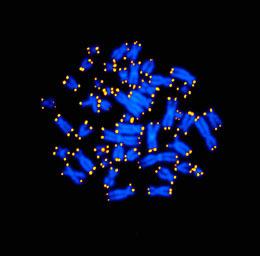Turmeric has long been used as a natural way to treat a host of ailments. Mahtab Jafari’s study is the first to show how its active ingredient impacts age-associated genes and increases longevity in fruit flies. Image: Daniel A. Anderson
Along with giving curries and other spicy Asian dishes a bright golden color and peppery flavor, turmeric has been used for centuries as an herbal medicine to treat a host of ailments, like upset stomach, arthritic pain, cuts and bruises.
Mahtab Jafari, associate professor of pharmaceutical sciences at UC Irvine, has discovered that the main active ingredient in turmeric may have even greater health benefits. In a study published in Rejuvenation Research, she and Korean researcher Kyung-Jin Min found that curcumin extended the lifespan of fruit flies by up to 20 percent, while improving locomotion and having tumor-prevention properties.
As a member of the Susan Samueli Center for Integrative Medicine, Jafari studies the potential anti-aging qualities of foods many people use for their purported health benefits, such as Rhodiola rosea, green tea extract and Rosa damascena, which is found in rose water.
“Mahtab’s research area is extremely important, because most herbals and medicinal foods remain unregulated, with little scientific evidence that they’re effective or safe,” says Dr. Wadie Najm, the Samueli Center’s medical director. “Her work builds a great foundation for letting us know whether a product really provides health benefits.”
Here, Jafari discusses her findings about curcumin and shares insights on medicinal foods and herbal remedies in general.
Q: Why did you focus on curcumin?
A: Curcumin has many reported therapeutic benefits in humans. Preliminary results from laboratory studies suggest that the spice has anti-inflammatory, anticancer and antioxidant properties. Currently, the National Institutes of Health is also funding basic research on the potential role of curcumin in preventing acute respiratory distress syndrome, liver cancer and postmenopausal osteoporosis.
Q: Why did flies that received curcumin supplements live longer?
A: While curcumin works as an antioxidant, we don’t exactly know why flies lived longer. But since curcumin affected age-associated genes, we can hypothesize that it affected the aging process.
Q: How can this translate into longer, healthier lives for people?
A: Although flies and humans share many genes and aging pathways, we won’t be able to extrapolate our work to people. However, there are a number of current human studies on the benefits of curcumin.
Q: Any words of warning about medicinal foods?
A: There are many media reports on their advantages, but unless such products are evaluated in sound scientific studies for their efficacy and safety, the public should be skeptical. Knowledge is power! People need to scrutinize hype.
Q: Many cultures have advocated certain foods for improving health. Which claims have been scientifically proven?
A: I believe science is behind in studying the value and therapeutic benefits of the medicinal foods and practices of various groups around the globe. In many cultures, native plants are used in their natural form or in high-quality extracts. Unfortunately, the authenticity of some of these “natural” products in the U.S. market could be questionable. Regardless, there are many plants and food products scientifically proven to have positive effects on our health — gingko, fish oil, ginseng, garlic, antioxidant fruits such as berries and, of course, the main plant I work with, Rhodiola rosea.
Q: How did you develop an interest in this field of research, and does it influence your use of medicinal foods?
A: Until 2005, I worked mainly with pharmaceuticals. But when I joined UCI’s new pharmaceutical sciences program in January 2005, using the fruit fly as my model system, I screened about 75 pharmaceuticals and botanicals for their potential anti-aging properties. Only a few botanical extracts extended the fly lifespan without compromising its health. After learning more about these and realizing how safe they are, I shifted the focus of my work to plants.
On a personal level, I’ve always been fascinated by the benefits of medicinal foods and how herbal remedies from various cultures have been used for hundreds and thousands of years around the globe. Yet Western medicine doesn’t approve of them due to the lack of scientific data. My research is an opportunity to change this.
 Protecting chromosome tips doesn't just prevent ageing. It can reverse it.Peter Lansdorp/Visuals Unlimited/Corbis
Protecting chromosome tips doesn't just prevent ageing. It can reverse it.Peter Lansdorp/Visuals Unlimited/Corbis
